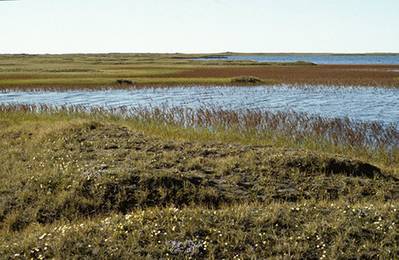Senator Lisa Murkowski, an Alaska Republican, won a decades-long battle on Wednesday to open part of an Arctic wildlife reserve in her state to oil and gas drilling, but Democratic senators and conservationists vow the war has only begun.
The tax bill passed by Congress contains language pushed by Murkowski and supported by President Donald Trump to hold two lease sales in the 1.5 million-acre (600,000-hectare) 1002 area on the northern coastal plain of the Arctic National Wildlife Refuge, or ANWR.
Democrats and environmentalists deplore the prospect of development in ANWR, home to polar and grizzly bears, 200 species of birds, and where Gwich'in natives depend on migrating herds of porcupine caribou.
Senator Maria Cantwell, a Democrat, said the fight over the drilling was not over. "In fact I would say today is the beginning," said Cantwell adding that Democrats would make sure the Trump administration follows all environmental laws before allowing drilling.
Murkowski said ANWR oil would provide jobs, reduce U.S. imports of crude and help fill the Trans-Alaska Pipeline, a source of oil for the U.S. West Coast. The pipeline is now operating at a quarter of its capacity, after Alaskan production slumped in recent years.
Trump, expected to quickly sign the tax bill into law, said he had not been aware that fellow Republican politicians had long been trying to get at the oil in ANWR.
"A friend of mine who is in the oil business said: 'I can't believe it. ANWR. They've been trying get it for 40 years,'" Trump said at the start of a Cabinet meeting.
Trump said opening ANWR, a move supported by some members of the native Iñupiat tribe, would put the country, already the world's top oil and natural gas producer, at a new level.
Every Step of the Way
But environmentalists said there were many stages, such as applications by companies to conduct seismic tests in the refuge, at which they could block drillers with lawsuits over endangered species and other environmental laws.
Suzanne Bostrom, a lawyer at Trustees for Alaska, a nonprofit environmental law firm, said opponents would scrutinize applications by energy companies for exploration, development, leasing and oil and gas production.
"We will be working every step of the way to make sure that the coastal plain is protected," said Bostrom. The Interior Department will carry out environmental reviews of the lease sales, one to be held within four years and another within seven years, that opponents will track.
Environmental lawyers have had success in stopping drilling in the harsh and frigid Arctic. In 2015, Royal Dutch Shell (RYDAF) ended a $7 billion quest to find oil offshore Alaska partly because environmental groups uncovered a little-known law that limited the number of drilling wells.
Analysts at British bank Barclays (BCS) said environmentalists could delay the lease sales and project approvals and "may discourage investment" entirely. Still, the bank said if new surveys show promising ANWR deposits, the region could attract producers that drill in frontier regions in Latin America and the Middle East.
Senator Edward Markey, a longtime opponent of Arctic drilling, said the Republican tactic of including the drilling in a bill that only needed 50 votes in the Senate could backfire and help Democrats pick up seats in the 2018 congressional elections.
Nobody knows how much oil the refuge contains, but the U.S. Geological Survey estimated in 1998 that the 1002 area held about 10.4 billion barrels of recoverable crude.
But a global oil glut that has kept domestic oil prices at levels below $60 a barrel may prevent wide success in ANWR. In a lease sale this month for land in Arctic Alaska, less than 1 percent of the 10.3 million acres (4.2 million hectares) received bids from oil companies.
(Reporting by Timothy Gardner; Additional reporting by Roberta Rampton; Editing by Richard Valdmanis and Peter Cooney)













